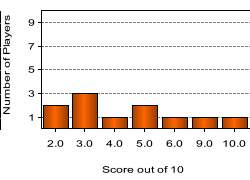Quiz Answer Key and Fun Facts
1. In the beginning of the novel, Nadezhda, known as Nadia to her family and friends, answers a phone call. It is from her father, and he has explosive news. He's going to get married to Valentina, a young Ukrainian woman he has known for three months. She has even come to visit him on a tourist visa. Her father then goes into great detail about Valentina, but which of these things does he not mention?
2. Nadia explains to her father that Valentina is only marrying him because she wants a visa and a work permit, so that she can stay in the UK. Her father is well aware of this, and has already approached many people in his town to try and find her a more suitable husband, but this has put strain on his relationship with the local people. Which of the following people (or groups) has not disowned him due to his zeal to find a suitable mate for Val?
3. Their mother's death soon comes into the fore. Nadia considers her father's situation and starts to wonder if it began just after her mother died. She reminisces of how she looked after her mother in her final days. Nadia would recite memories from her and Vera's childhood while her father would sit and brood, occasionally wailing with despair. Left to die at home, Nadia's mother worried for her family, and asked Nadia and Vera to look after their father. What did Nadia's mother Ludmilla call her husband in her "own DIY language"?
4. Shortly after their mother died, Vera and Nadia were forced together for the funeral. It wasn't long before the already strained relationship between the sisters began to sour even further. Vera had got their mother to sign a codicil, so that, instead of the money saved by Ludmilla being split between Nadia and Vera, it was split between Vera and Nadia's daughters. This meant that Vera got twice as much cash as Nadia, as she had two daughters (Alexandra and Alice), while Nadia only had one (Anna). There was something that upset Nadia even more, though. What was it?
5. It is not only the sisters who are at war - their father is slowly waging a war against himself. This is the first mention of his reaction to the death of his loving wife Ludmilla, and it comes as a stark contrast to the life the couple led before her death. How does Nadia claim her father is "punishing himself" in a vain attempt to bring Ludmilla back?
6. Back in the present day, Nadia receives a second phone call from her father on the subject of the now fabled Valetina. This time, it is on the subject of reproduction - he wants to know if it is possible for a man of 84 to father a child.
Nadia is rather disgusted, but her father drifts off into a dream-like state on the phone. Nadia knows that he is pondering the possibility of him having a son. Her father's greatest regret is that both his children were daughters. How does Nadia describe herself and her sister, as if to give her father a reason to harbour such feelings?
7. When Ludmilla was still living in the family home, her garden and larder were something to be admired. The well-stocked garden provided vegetables and herbs for the whole family all year around, and when the family finally bought a freezer, there was enough food to "feed an army", for Ludmilla had known hunger. What would she tell Nadia, when she was called on her food storage obsession?
8. While Vera and Nadia were forced to endure their mother's traditional Ukrainian recipes, and wear home-made clothes sewn from market remnants, their father would work and buy extravagant new possessions with his wage. Motorcycles, cameras, and new furniture were bought with the money he received from work. What was his job?
9. Of course, after the stand-off between Nadia and Vera following the funeral, their relationship is now almost non-existent. One night, while her husband Mike and daughter Anna are out, Nadia receives a phone call from her sister. Although Vera merely wants Nadia to countersign a document so that Vera's daughter could buy a flat, all of the hurtful things that had never been said began to flood out. Vera speaks of how Nadia was too busy with her fabulous career to drop everything and go to her mother's bedside. What does Nadia say in retaliation?
10. The conversation drags on as the phone spits and crackles with their rage. Vera, condemning Nadia for her "namby-pamby" job (which meant she couldn't look after Ludmilla when she died), and Nadia condemning Vera for her gung-ho attitude and how she forced herself on their mother, whether she was wanted there or not.
The codicil, which was mentioned earlier, meant that Vera got twice as much money as Nadia, and this comes up in the conversation. Nadia says she would rather the money went to Oxfam than be split between her and Vera. Vera claims that this is pathetic. So what happens to the money in the end?
Source: Author
Flynn_17
This quiz was reviewed by FunTrivia editor
MotherGoose before going online.
Any errors found in FunTrivia content are routinely corrected through our feedback system.

